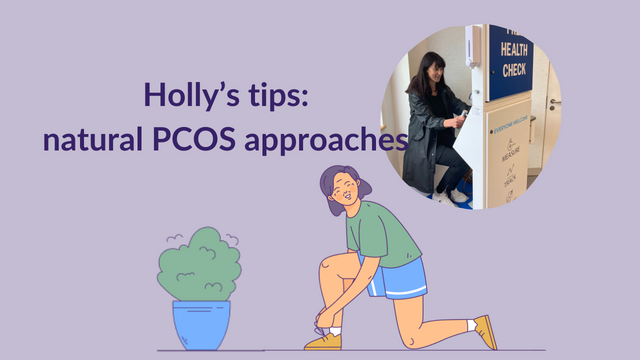Natural approaches to PCOS
Holly Stone • 2024-02-10
As part of our series for International Women's Day 2024, we are empowering women with natural approaches to managing PCOS.
Approaching International Women's Day 2024, our commitment to highlighting women's health continues. After delving into the intricacies of premenstrual syndrome (PMS), our focus now shifts to polycystic ovary syndrome (PCOS). An endocrine condition affecting one in every 10 women in the UK, PCOS manifests as a combination of fluid-filled sacs that surround the eggs, enlarged ovaries, excessive secretion of male sex hormones (testosterone), and irregular periods. The diverse symptoms associated with PCOS can significantly impact self-esteem and overall quality of life. Managing PCOS proves to be challenging, given its complexity and the difficulty in diagnosis. Additionally, it is linked to a heightened likelihood of encountering health issues, including the development of type 2 diabetes. Therefore, emphasising the importance of and directing attention towards managing blood glucose levels is a strategy we talk through as we continue through this blog.
Our aim is to provide valuable insights into natural approaches for managing the symptoms whilst acknowledging the multifaceted nature of PCOS and its profound effects on women's well-being.
Lifestyle Changes
- Ensure you are incorporating aerobic exercise of moderate intensity into your week, ideally for 30 minutes, 3-5 times per week as this is effective at lowering blood glucose levels improving mental health, and cardiovascular function. This can include things such as walking, running, hiking and swimming. Just 5% of weight loss has proven to be beneficial in alleviating the symptoms of PCOS.
- Ensure you get sufficient sleep. Inadequate sleep, whether in terms of quality or duration, is linked to compromised blood sugar control and heightened cortisol production, the body's stress hormone. Moreover, it disrupts appetite signalling, potentially causing increased cravings and overeating.
- Given the link between PCOS and cardiovascular disease, it is imperative that women with PCOS are supported and encouraged to cut down on cigarette consumption (https://stopsmokinglondon.com/).
- Other measures that help mitigate the cardiovascular risk associated with PCOS include reducing salt intake (<6g/day) and caffeine intake (<200mg/day).
Balancing Blood Glucose One of the first things we need to do to help our hormones function properly is to make sure our glucose levels are balanced, and this is paramount for PCOS sufferers where insulin resistance underpins PCOS and is often found in many women suffering the condition. It is therefore so important to be aware of good blood sugar control, and strategies to modulate insulin spikes through the following methods:
- Include good protein sources at every meal e.g. quinoa as protein increases feelings of fullness and improves the blood glucose response.
- Increase fibre intake as it slows absorption of carbohydrates etc, and therefore prevents rapid blood sugar spikes.
- Cinnamon lowers blood sugar levels. Try adding to food where possible e.g. in your morning porridge whilst also including some healthy fats to further slow down rapid blood sugar spikes.
- Apple cider vinegar would be useful to take a tablespoon with water before meals (or at least one meal per day or add to salad dressings) as it can help improve insulin sensitivity, aid in weight loss and help regulate periods which are top priorities in symptom management.
- Magnesium and vitamin D are also important for glucose transport. Foods high in magnesium include cucumber, oats, broccoli, cabbage, nuts, seeds, and brown rice amongst others. Vitamin D Food sources include eggs, salmon and mushrooms although it is essential to note that vitamin D is primarily obtained from sunlight. Therefore, supplementation is advisable during the winter months and even all year round as recommended by the NHS especially when so many of us work indoors.
- Ensure you are including the right carbohydrates into your diet such as complex carbohydrates and carbohydrates that are high in fibre over simple carbohydrates like white breads, pasta, pastries, sweets etc. This can help maintain healthy blood sugar levels avoiding blood sugar spikes followed but sudden drops which is so important to limit for those suffering from PCOS.
- Focus on whole fresh fruit and vegetables that have a low GL (glycaemic load) e.g. cherries, apricots, pears, carrots, sweet potatoes, broccoli and lentils.
- Eat regular healthy balanced meals and avoid excessive snacking. Consistent snacking can lead to frequent spikes in blood sugar. When opting for snacks, prioritize healthy choices that offer balance, such as protein-rich options, nuts, chopped vegetables, fruit etc to avoid these spikes.
- Opt for savoury breakfasts as opposed to sweet which helps ensure a stable level of insulin thereby reducing insulin spikes, especially first thing in the morning when cortisol levels are naturally high.
Dietary Changes
- Include essential omega-3 fatty acids such as flaxseeds, Brussel sprouts, and wild salmon as these have been shown to promote regular ovulation, reduce blood pressure, and improve triglyceride levels and insulin sensitivity. Omega 3 Fatty acids also help with the chronic inflammation associated with PCOS
- Brassica/cruciferous vegetables (kale, cauliflower, broccoli) in the diet help the liver to detox excess oestrogen.
- Support gut health by incorporating fermented foods such as sauerkraut, kefir and kombucha as well as increasing fibre-rich foods.
- Do not include too much added oil in your diet as you do not want to contribute to the increase of oil produced from testosterone.
- Avoid fried foods, processed snacks, sugary drinks, and alcoholic beverages and limit red meat as these can increase inflammation, and negatively impact cardiovascular health.
In Summary
In closing, as we navigate women's health this International Women's Day, it's evident that empowering choices are pivotal to our well-being. Reflecting on the multifaceted nature of conditions like PCOS, we recognize the impact of lifestyle adjustments and dietary habits.
Throughout, we've uncovered strategies to enhance our health, from incorporating aerobic exercise to mindful dietary choices that balance blood glucose levels. By embracing these strategies, we reinforce the notion that our bodies respond to the nurturing we provide. Let this International Women's Day be a reminder that each choice, no matter how small, contributes to women's hormonal health.
Finally, It's important to note that all these approaches will play a part in supporting and improving symptoms associated with this condition but they do not substitute for professional medical advice.
Resources
https://pcosweightloss.org/home/
https://www.rcog.org.uk/media/q5ijt5ur/pi_pcos_update-2022.pdf
https://www.rcog.org.uk/media/qmtlp2b0/gtg_33.pdf
https://www.naturopathy-uk.com
https://www.chucklinggoat.co.uk/natural-ways-to-reduce-your-symptoms-of-pcos/
https://stopsmokinglondon.com/
https://www.nhs.uk/conditions/polycystic-ovary-syndrome-pcos/
https://www.bda.uk.com/resource/polycystic-ovary-syndrome-pcos-diet.html
See More Posts
SiSU Health UK
Copyright © 2023 SiSU Health Group.
All rights reserved.






